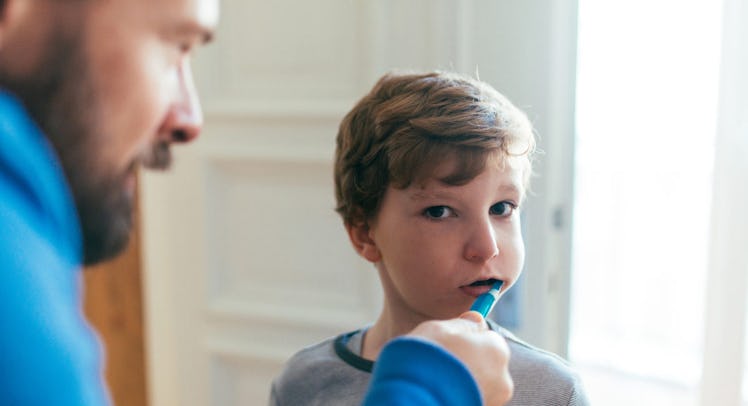How to Manipulate a Kid Into Brushing Their Damn Teeth
In the battle of the brush, some choice in weapon, a song and a bit of play can win the day.

Teaching a child to brush their teeth and educating them on the value (monetary for parents) of dental hygiene is a long, arduous process. It often includes fits, tantrums, sarcastic brushing, angry bushing, tears, and spit. It is, in short, unpleasant. But it doesn’t have to be. Brushing can become a twice-daily bonding ritual that fosters independence if parents take the time to properly manipulate their child into believing that brushing is an act of independence. Machiavelli’s kids must have had great teeth.
“Don’t make it an activity that you do to them. It needs to be something that they do for themselves,” says Dr. Joseph Castellano, president-elect of the American Academy of Pediatric Dentistry. “What you don’t want to do is make it something where they go, ‘Oh god, here comes dad with a toothbrush.’”
Granted, that’s a necessity for the first several teeth. But brushing the baby chompers helps establish a routine that becomes ingrained into their day as sure as sunrise or sunset. At this point, it’s less about minutes polishing the pearly whites and more about helping the kid get used to a brush in the mouth. To that end, when a parent first begins brushing a kid’s teeth, they need to make sure the brush head fits comfortably in the child’s mouth and isn’t particularly abrasive. Making sure you don’t hurt kids is a good strategy in life (just generally), but also an important one when it comes time to brush.
As your kid grows more independent and sprouts more Chiclets, the toothbrush needs to change with their growing bodies and skills. For example, brushes with wider handles help little hands more effectively grip the brush as they learn coordination. But that’s where the necessaries end. Everything else should be up to the kid.
“Allowing them to choose their toothbrush — whatever color or character it is on it — or perhaps even a toothpaste, it’s encouraging to them: ‘I’m being independent. I’m doing things on my own,’” says Castellano.
And they are, kind of. When they take the reins for their own supervised brushing sessions, patience and empathy become a parent’s best tools. Kids simply can’t grasp the process easily, especially with all the motor skills involved with brushing — technique, not swallowing, and moving the brush around their mouth — and that’s before floss enters the picture.
“In the very beginning, it’s difficult and they don’t understand. It’s important to get them in the routine,” says Castellano. “You can do the ‘tell show do’: Look, we’re gonna brush our teeth. This is how I brush my teeth. You copy me. Keep it light, keep it fun.”
The routine—twice daily, two minutes at a time—allows for the repetition that will slowly but help them develop their skills and become a master of their own mouth. It helps, too, to make the time enjoyable. Get down with a two-minute song (nobody says there’s no dancing in toothbrushing). Or play make believe by pretending the toothbrush is an airplane or a unicorn diving in and out of a smiling mouth. The important part is that the routine is free of stress and yelling or forced brushing, which can lead to negative associations.
But if working on brushing inside the bathroom isn’t working, parents can play toothbrushing outside the bathroom too. Just like a roleplaying a doctor visit can help a kid understand the process of an exam, playing dentist can help them become more comfortable taking charge of their chompers while also honing their motor skills.
“You can get a small stuffed animal or a doll and have them practice with the back and forth motions, then move on to the circular motion,” says Castellano. “They’re getting the practice, but not always in their mouth. They develop the skill and they can move along faster.”
But even with a practice, a song, an Iron Man toothbrush and paste that tastes like cotton candy, a kid can remain reluctant. There’s no harm in nudging them with a little extra treat.
“You have to modify the behavior, and sometimes rewarding them for doing something they may not really like is a way to establish positive habits that encourage good oral health,” says Castellano.
This article was originally published on